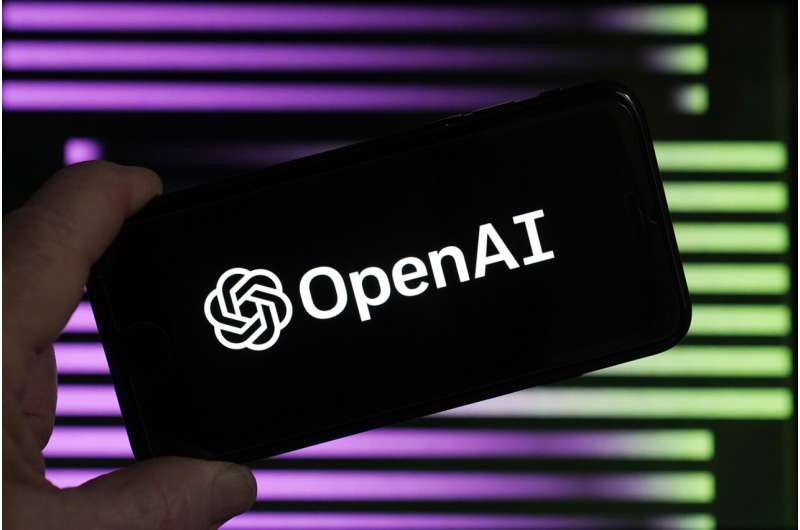This article has been reviewed according to Science X's editorial process and policies. Editors have highlighted the following attributes while ensuring the content's credibility:
fact-checked
reputable news agency
proofread
ChatGPT-maker OpenAI signs deal with AP to license news stories

ChatGPT-maker OpenAI and The Associated Press said Thursday that they've made a deal for the artificial intelligence company to license AP's archive of news stories.
"The arrangement sees OpenAI licensing part of AP's text archive, while AP will leverage OpenAI's technology and product expertise," the two organizations said in a joint statement.
Financial terms of the deal were not disclosed.
OpenAI and other technology companies must ingest large troves of written works, such as books, news articles and social media chatter, to improve their AI systems known as large language models. Last year's release of ChatGPT has sparked a boom in "generative AI" products that can create new passages of text, images and other media.
The tools have raised concerns about their propensity to spout falsehoods that are hard to notice because of the system's strong command of the grammar of human languages. They also have raised questions about to what extent news organizations and others whose writing, artwork, music or other work was used to "train" the AI models should be compensated.
This week, the U.S. Federal Trade Commission told OpenAI it had opened an investigation into whether the company had engaged in unfair or deceptive privacy or data security practices in scraping public data—or caused harm by publishing false information through its chatbot products. The FTC did not immediately reply to a request for comment on the investigation, which The Washington Post was first to report.
Along with news organizations, book authors have sought compensation for their works being used to train AI systems. More than 4,000 writers —- among them Nora Roberts, Margaret Atwood, Louise Erdrich and Jodi Picoult—signed a letter late last month to the CEOs of OpenAI, Google, Microsoft, Meta and other AI developers accusing them of exploitative practices in building chatbots that "mimic and regurgitate" their language, style and ideas. Some novelists and the comedian Sarah Silverman have also sued OpenAI for copyright infringement.
"We are pleased that OpenAI recognizes that fact-based, nonpartisan news content is essential to this evolving technology, and that they respect the value of our intellectual property," said a written statement from Kristin Heitmann, AP senior vice president and chief revenue officer. "AP firmly supports a framework that will ensure intellectual property is protected and content creators are fairly compensated for their work."
The two companies said they are also examining "potential use cases for generative AI in news products and services," though didn't give specifics. OpenAI and AP both "believe in the responsible creation and use of these AI systems," the statement said.
OpenAI will have access to AP news stories going back to 1985.
The AP deal is valuable to a company like OpenAI because it provides a trove of material that it can use for training purposes, and is also a hedge against losing access to material because of lawsuits that have threatened its access to material, said Nick Diakopoulos, a professor of communications studies and computer science at Northwestern University.
"In order to guard against how the courts may decide, maybe you want to go out and sign licensing deals so you're guaranteed legal access to the material you'll need," Diakopoulos said.
The AP doesn't currently use any generative AI in its news stories, but has used other forms of AI for nearly a decade, including to automate corporate earnings reports and recap some sporting events. It also runs a program that helps local news organizations incorporate AI into their operations, and recently launched an AI-powered image archive search.
The deal's effects could reach far beyond the AP because of the organization's size and its deep ties to other news outlets, said news industry analyst Ken Doctor.
When AP decided to open up its content for free on the internet in the 1990s, it led many newspaper companies to do the same, which "turned out to be a very bad idea" for the news business, Doctor said.
He said navigating "a new, AI-driven landscape is deeply uncertain" and presents similar risks.
"The industry is far weaker today. AP is in OK shape. It's stable. But the newspaper industry around it is really gasping for air," Doctor said. "On the positive side, AP has the clout to do a deal like this and can work with local publishers to try to assess both the potential and the risk."
© 2023 The Associated Press. All rights reserved. This material may not be published, broadcast, rewritten or redistributed without permission.




















